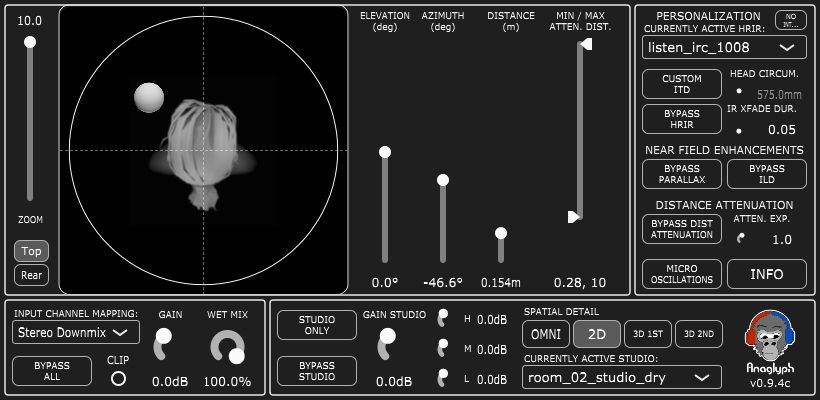
Anaglyph
Anaglyph is a 3D high-definition binaural spatializer.
Anaglyph is part of an ongoing research effort into the perceptual and technical capabilities of binaural rendering. The latest incarnation, Anaglyph VST, has been designed as an audio plugin to both support ongoing research efforts as well as to make accessible the fruits of this research to audio engineers through traditional existing DAW environments.
Amongst its features, Anaglyph includes a personalizable morphological ITD model, near-field ILD corrections and HRTF parallax selection, a Localisation Enhancer, an Externalisation Booster, and SOFA HRIR file support.
HRIR/HRTF Personalization : Customization of binaural rendering parameters for a given listener. Select here the specific HRTF (ears), by choosing an appropriate HRTF/SOFA file. Tailor HEAD SIZE to optimize lateral cues.
Near-Field Enhancements : Rendering enhancements that improve the sensation of distance for nearby source positions. PARALLAX correction selects HRIR positions based on the actual direction of arrival of the sound object as “seen” by each ear, rather than using the head-centered coordinate system. ILD correction modifies the right/left levels, as a function of frequency, to account for the head shadowing effect of nearby sound objects. This modification is applied predominantly to the opposite side ear, in an effort to maintain sound level of the nearby ear.
Externalization Booster : When rendering sounds over headphones, a common artifact is that sounds seem to be very near, or even inside, the listeners head. This does not typically occur when listening over monitor speakers in a studio. This module adds the subtle acoustic cues of a reproduction system in an acoustically controlled studio, providing improved externalization. This is not to be confused with a reverberation plug-in. GAIN, EQ, and SPATIAL DETAIL level can be adjusted to optimize the effect for the given soundscape to improve transparency while providing these additional cues.
Stabilization Enhancer : In the case of non-tracked binaural rendering, static source positions are sometimes difficult to localize correctly, with front/back confusions often occurring for sources in certain regions. To reduce such confusions, and to help stabilize the perceived position of the sound object, the actual rendered position is varied slightly, providing “added redundancy” of localization cues to the brain, reducing localization confusion.
Visit: Anaglyph
